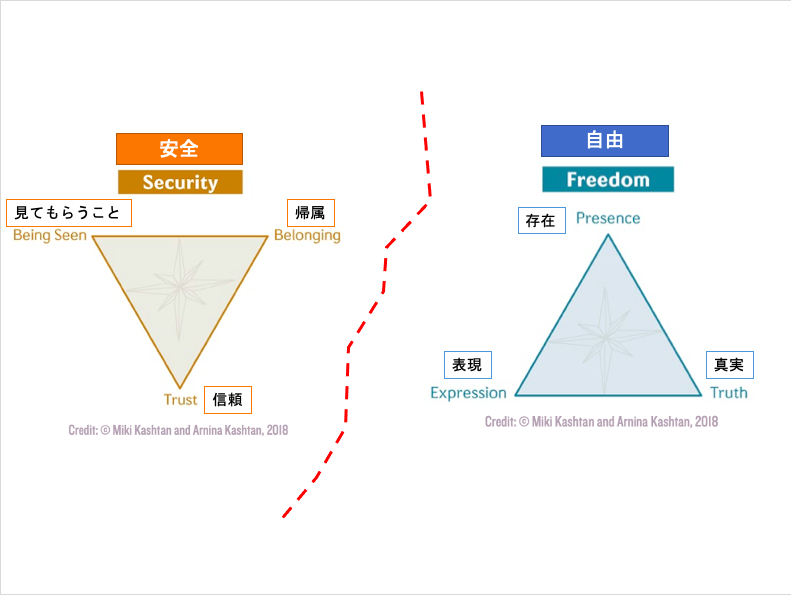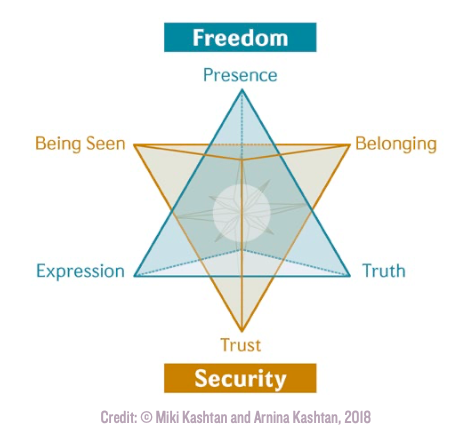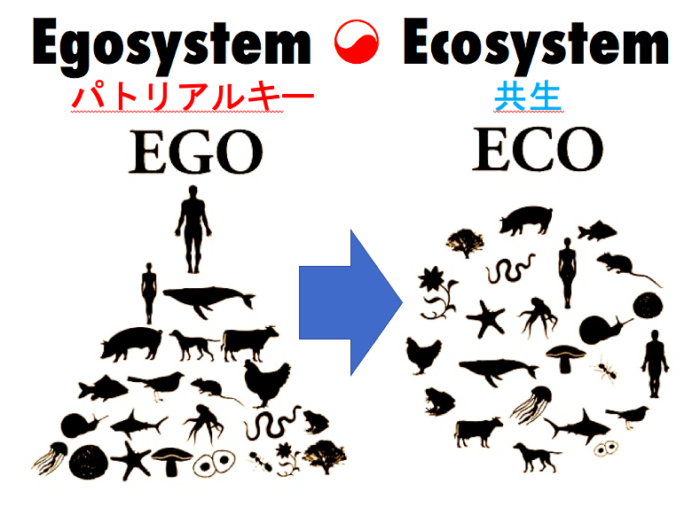最近、自分が恐れから動いていることが気になる
moved by fear
いつもでは無いけど、どこか肝心なところでズレがある感じかな
いろんな場面で感じる
パートナーシップとか、子供との接し方とか、不安があるときの人との接し方とか、誰かに強く何か言われた時とか、権力のある人と接する時とか。。。。。
なぜ、そうしてしまうのだろう?
アクティビストになって、非暴力コミュニケーションを学んでから、自分の中のズレに関心が向くようになった。平和活動って、在り方の探求でもあるから。意識の冒険
(ちなみに、アドバイス、分析、評価・批判は求めてないよ。共感と理解はありがたいけど。他人と自分に評価されていることにお疲れ中。)
さて、最近すごく興味がある分野が、非暴力 x 子育て x 社会変革。
(非暴力活動家、NVCトレーナーMiki Kashtan ミキ・カシュタンの影響が大きい)
NVC仲間とよく話題にするのが、パワーの格差、ランク、特権など。そこで、男女や所得層、民族、ジェンダーなどなどの格差は意識にあったけど、子供と大人の格差については考えたことがあまりなかった。大人が子供をしつける、「正しさ」を教える、評価批判するのは当たり前だった。
娘を愛しているし、彼女には自分の人生をかけているけど、いろんな場面で自分のパワーを使って彼女がやりたく無いこと(味噌汁を食べるとか、歯磨きするとか)をさせている。それが心地悪い。でも、自然とそうしてしまったり、自分がどうしたらいいかわからず、疲れている状態に理想をだいぶ犠牲にしてしまう。
そこで大事だと思うのが自分の癒し。
傷を負った大人が、次の世代を育てる中で、傷を再現してしまうことがある。そうやって悲劇は続いてしまう。でも、自分のトラウマや深い傷を癒せたら、もっと愛に忠実に在れるんじゃないかな?
そんな、ここまで書いてきたテーマをアクティビスト大先輩のミキとアルニーナ・カシュタンが素敵な記事にまとめていたので、いくつか面白いポイントだと思ったことをシェアしたかった。
Patriarchy (パトリアルキー?家父長制って訳されたりする)が記事の重要なコンセプト。支配構造ともよんだりする。
Parenting without Obedience (服従のない育児)Miki & Arnina Kashtan
英語読める人は超オススメ!its quite revolutionary
*アプリで訳しているからちょっと変な訳もあるかも
Patriarchy, as we understand it, emerges from a fundamental separation from self, other, life, and nature
私たちが理解しているかぎり、家父長制は、自己、他者、生命、自然からの根本的な分離から生まれます。
in order to interrupt the reproduc- tion of patriarchy. One of the core necessary pieces is to transition to collaborative parenting being the norm rather than the rare excep- tion. Without it, even if we somehow manage to transform the larger political and economic social structures, each generation anew will
be exposed to the impossible internal conflicts and compromises that patriarchal training de- mands of us, internalize the dominant version of reality in order to survive, and inevitably recreate the existing relations and institutions. More significantly, without shifting our parent- ing, we might run out of sufficient collective capacity to love.
家父長制の再生産を中断させるために。そのために必要な核心的な要素の一つは、協力的子育てを例外的なものではなく、標準的なものへと移行することです。それがなければ、たとえ私たちがより大きな政治的・経済的社会構造をどうにかして変革することができたとしても、新たに生まれ変わる各世代は、家父長的な訓練が私たちに要求する不可能な内部対立や妥協にさらされ、生き残るために支配的な現実を内在化し、必然的に既存の関係や制度を再構築することになるでしょう。さらに重要なことに、私たちの子育てをシフトすることなく、私たちは愛するための十分な集合的な能力を使い果たしてしまうかもしれません。
we raise children in an environment of obedience, shame, scarcity, and often narrow self-interest, fully interfering with the flow of love and with children’s abil- ity to experience freedom, belonging, natural abundance, and genuine care for the whole.
私たちは、従順、恥、希少性、そしてしばしば狭い利己心の環境の中で子供たちを育て、愛の流れと自由、帰属、自然な豊かさ、そして全体のための真のケアを体験する子供たちの能力を完全に妨害してしまってます。
Patriarchy and its main educational institu- tions (parenting and schooling) have achieved this feat of maintaining domination over so many generations through direct coercion when possible, and through indirect coercion in the form of shaming when not.
家父長制とその主要な教育機関(子育てと学校教育)は、可能な場合には直接強制、不可能な場合には恥をかくという形で間接的に強制することで、多くの世代にわたって支配を維持するという偉業を成し遂げてきた。
core value of patriarchy in relation to children, it’s, sadly, obedience. It’s seen as a virtue rather than as a traumatic experience.
子供に対する家父長制の中心的な価値観は、残念なことに、従順さです。それはトラウマというより美徳として見られています
With patriarchy, sham- ing becomes a central mechanism for raising children. Because, as children, our need for belonging is so vulnerable, through shaming this need is mobilized to maintain the power of the imposed patriarchal order.
家父長制のもとでは、恥をかくことが子どもを育てるための中心的なメカニズムとなっている。なぜなら、子どもとしての私たちの帰属の必要が非常に脆弱であるため、恥をかくことによってこの欲求が動員され、押し付けられた家父長制秩序の権力を維持することになるからです。
Patriarchal upbringing, however, undermines trust through repeated experiences of trauma resulting from persistent coercion and sham- ing and the chronic experience of needs not being attended to
しかし、家父長的な教育は、永続的な強制と偽りから生じるトラウマの繰り返しの経験と、ニーズが満たされないという慢性的な経験を通して、信頼を弱めている。
it leaves an overwhelming number of us with a propen- sity to believe we are fundamentally “wrong,” leading us to hide our “unwanted” parts and cease our “unwanted” behavior in order to re- gain acceptance in the group.
それは私たちの圧倒的な数を残して、私たちは根本的に「間違っている」と信じて、私たちの「不要な」部分を隠し、グループの中で再び受け入れられるようにするために、私たちの「不要な」行動をやめるように導いています。
Through both coercion and shaming, one of patriarchy’s core ways of interfering with development takes the form of separating and opposing two sets of crucial needs.
強制と恥ずかしさの両方を通して、家父長制が発達を妨害する核心的な方法の一つは、2つの重要なニーズを分離し、対立させるという形をとるものである。

As children, our security triangle is not a given; we have to earn it by being “good,” which means, essentially, overall obeying and following adults’ ideas and in- structions.
子どもの頃、私たちの安全の三角形は与えられたものではなく、「良い」ことによってそれを獲得しなければなりません。
the price of security and belonging is loss of the freedom to be who we fully are.
安全と帰属の代償は、私たちが完全に自分らしくいることの自由を失うこと。
We give up much of who we are, our authentic expression, our truth as it lives in us moment by moment, for the hope of being seen and accepted (even if only partially) as part of the whole
私たちは、私たちの自分らしさをあきらめ、私たちの本物の表現、それが私たちの中に住んでいるように私たちの真実は、全体の一部として見られ、受け入れられているという希望のために、瞬間ごとに瞬間的に、(たとえ部分的にのみ)。
our upbringing primes us to compete and fight with others for the few positions of dominance, where those are even available, or to submit to others’ dominance. How? By making love absent or conditional, by shaming us, and by creating impossible choices that divide us internally and keep us strug- gling with the fear of our secret “wrongness” being exposed.
私たちの教育は 私たちが競争したり 他の人と争ったりすることを前提としています 支配的な立場にある人たちがいても 利用できるところでは 他の人たちの支配に服従するのです どうやって?私たちを辱めることによって、愛を不在または条件付きにすることによって、そして私たちを内部的に分裂させ、私たちの秘密の “間違い “が公開されているの恐怖で苦労して私たちを保つ不可能な選択肢を作成することによって。
*翻訳の修正は後日やるかも
Parenting without Obedienceという記事の前半でした。
後半はこっちの話


